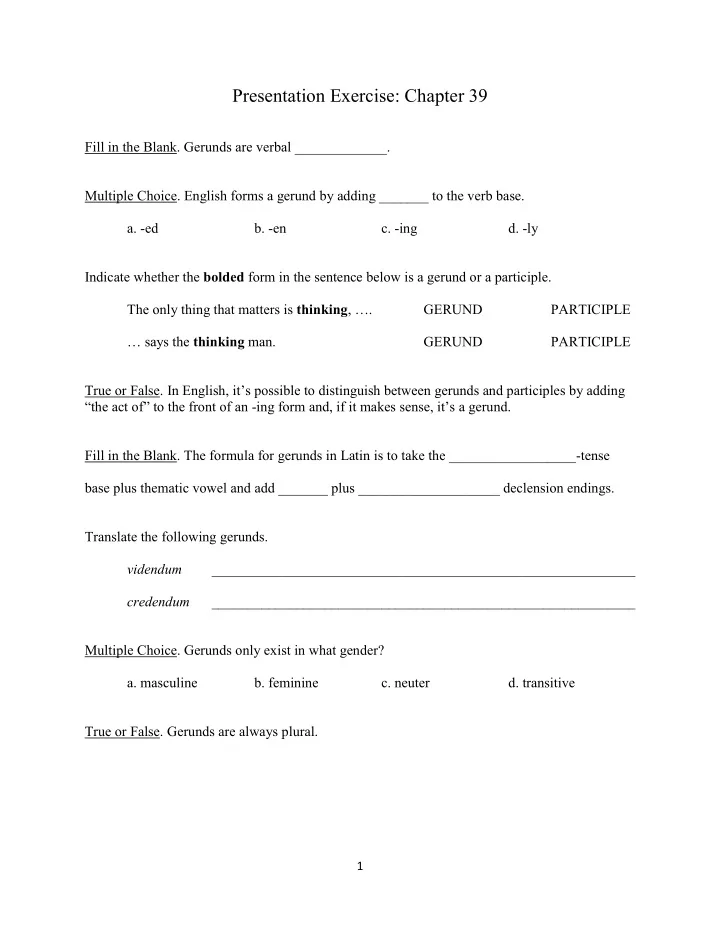

Presentation Exercise: Chapter 39 Fill in the Blank. Gerunds are verbal _____________. Multiple Choice. English forms a gerund by adding _______ to the verb base. a. -ed b. -en c. -ing d. -ly Indicate whether the bolded form in the sentence below is a gerund or a participle. The only thing that matters is thinking , …. GERUND PARTICIPLE … says the thinking man. GERUND PARTICIPLE True or False. In English, it’s possible to distinguish between gerunds and participles by adding “the act of” to the front of an - ing form and, if it makes sense, it’s a gerund. Fill in the Blank. The formula for gerunds in Latin is to take the __________________-tense base plus thematic vowel and add _______ plus ____________________ declension endings. Translate the following gerunds. videndum ____________________________________________________________ credendum ____________________________________________________________ Multiple Choice. Gerunds only exist in what gender? a. masculine b. feminine c. neuter d. transitive True or False. Gerunds are always plural. 1
Multiple Choice. Instead of the nominative gerund, Latin uses what form? a. present active participle c. present passive participle b. present active infinitive d. future active infinitive Which of the English sentences below accords more closely with the way Latin would say the following: “Living well is the best revenge.” “To live well is the best revenge.” Fill in the endings for each case of the gerund. Add the appropriate translation. CASE ENDING TRANSLATION Genitive _____________ __________________________________________ Dative _____________ __________________________________________ Accusative _____________ __________________________________________ Ablative _____________ __________________________________________ Circle the endings below which could be attached to a verb base to make a gerund (vs. a gerundive). -nda -ndum -ndas -ndam -ndae -ndi -ndo Multiple Choice. What is the most common use of Latin gerunds in the ablative case? a. manner b. accompaniment c. means d. separation Multiple Choice. Which of the following English words can take a direct object? a. love b. loving c. lovingness d. all of the above Multiple Choice. The Latin gerundive can be translated as a. “to be - ed” b. “must be - ed” c. both of the above d. neither of the above 2
True or False. Gerundives in Latin are adjectives. True or False. Even when gerundives are not part of a passive periphrastic construction, they retain a sense of “must be.” Complete the following equations: ENGLISH LATIN Gerund + Object = _____________________________ + Noun “by averting those dangers” = “by those dangers ____________________.” “… in doing the deed” = in facto _____________________________ True or False. To convert a Latin “ gerundive + noun ” construction into its English “ gerund + object ” counterpart , just “flip” the verb and noun around , thus inverting the grammatical relationship of the words. Multiple Choice. What is the correct Latin translation of the phrase “desirous of loving girls”? a. cupidus puellarum amandarum c. cupidus puellas amandi b. cupidus puellas amandarum d. cupidus puellae amandae Complete the four-step rule for translating gerunds and their nouns: 1. Take the English verb sense out of the ______________ form. 2. Add _________________. 3. Put it into the same case and construction as the Latin ________________ to which the gerundive is attached. 4. Make the noun the ________________________ of the -ing form. 3
Translate the following Latin phrases both literally and in better English. propter hostes metuendos Literal: _______________________________________________ Better English: _________________________________________ in bello gerendo Literal: _______________________________________________ Better English: _________________________________________ de urbibus defendendis Literal: _______________________________________________ Better English: _________________________________________ Fill in the Blank. Latin has two gerundive purpose constructions: (1) the preposition _______ + a/n _______________ (case) noun and gerundive; (2) a/n ______________ (case) noun and gerundive + _____________. Translate the following Latin phrases into their equivalent idiomatic English expression. ad urbem oppugnandum ______________________________________________________ ad veritatem loquendam ______________________________________________________ ad civitatem defendendam ______________________________________________________ ad consules interficiendos ______________________________________________________ ad vocem oratoris audiendam ___________________________________________________ militum hortandorum causā _____________________________________________________ vini ferendi causā ______________________________________________________ exsilii vitandi causā ______________________________________________________ navium capiendarum causā ____________________________________________________ solis videndi causā ______________________________________________________ 4
VOCABULARY Complete the information about the vocabulary items discussed in the presentation. For CATEGORY give the declension (adjectives), declension/gender (nouns), conjugation (verbs) or part of speech (others). For OTHER INFORMATION, include elements such as the word’s base. WORD CATEGORY MEANING/S OTHER INFORMATION AEDIFICIUM: __________ ________________________ ________________________ INIURIA: ____________ ________________________ ________________________ VOX: ____________ ________________________ ________________________ CUPIDUS: ____________ ________________________ ________________________ NECESSE: ____________ ________________________ ________________________ VETUS: ____________ ________________________ ________________________ ETSI: ____________ ________________________ ________________________ QUASI: ____________ ________________________ ________________________ EXPERIOR: ____________ ________________________ ________________________ OPPUGNO: ____________ ________________________ ________________________ Provide the correct translation for each Latin sentence below. Latin English Dubitando amisit occasionem. ____________________________________________ Petendo conatus est vitare mortem. ____________________________________________ Iniuriis vitandis facimus beneficia. ____________________________________________ Tyranno interficiendo se liberabunt. ____________________________________________ Veritate loquend ā amicos veros habebitis. ___________________________________________ 5
Recommend
More recommend